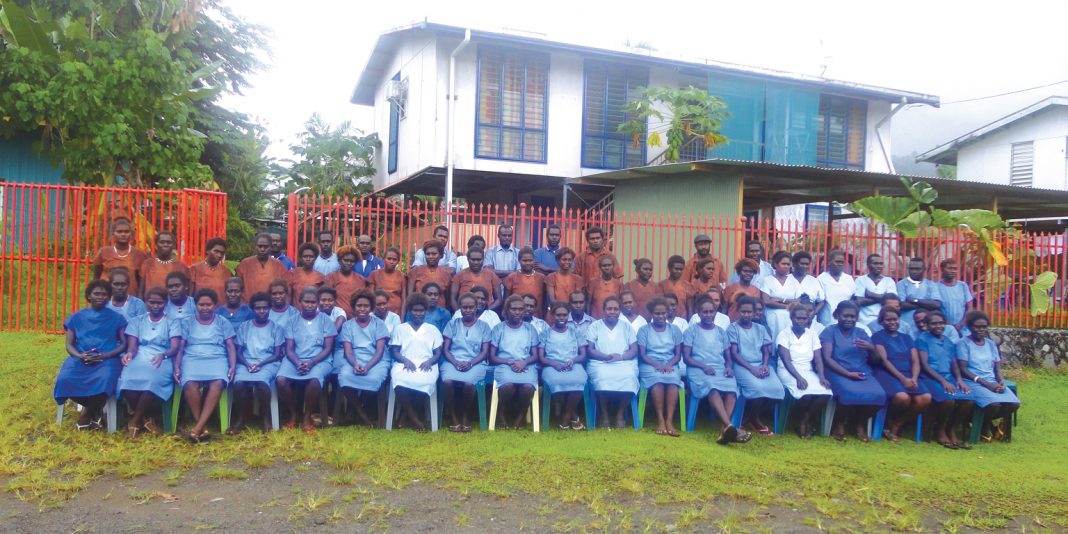Bougainville is training nurses once again, with the support of VSA and Kiwi nurses.
For nearly 30 years Bougainville had no nursing school. The local Arawa School of Nursing was destroyed in 1988 at the outset of the Bougainville Crisis and never reopened after the civil war between Papua New Guinea and the secessionist forces of the Bougainville Revolutionary Army ended 10 years later in 1998.
By 2016 not only was there a serious shortage of nurses to serve the around 250,000 residents of the Autonomous Region of Bougainville (ARoB), but the existing registered nurse workforce was close to, or even past, retiring age.
Two local health professionals, nurse Celyn Tusalah and medical officer Dr Joe Vilosi, were determined to remedy this. So in early 2016, despite having no government funding, 40 nursing students began their studies in a single classroom on the ground floor of a small house.
Soon afterwards the call went out from Bougainville’s health secretary and Tusalah, now the principal of the reopened Arawa School of Nursing, to New Zealand’s Volunteer Service Abroad (VSA) for volunteer support for the pioneering school.
VSA, which has deployed more than 20 health sector volunteers to Bougainville since 1998, agreed to the request and in January 2017 Kiwi nurses Drs Marian Bland and Mary Ann Hardcastle arrived in Arawa for one-year assignments as a nursing school management advisor and a health services and nursing management advisor, respectively.
VSA is currently recruiting for a new nursing school management advisor (along with other health-related Bougainville positions) and VSA Bougainville programme manager Paul Bedggood says the myriad challenges faced by the new nursing school, and the region, mean that the school will probably need periodic external support for at least five years.
Now back home, Bland says her year in Bougainville was one of the hardest and most rewarding things she has ever done.
“This was an amazing opportunity to share my skills and be part of educating a whole new generation of much-needed nurses,” she says.
Her year at the school began by being asked to help develop a new nursing curriculum for the school and watching a classroom being assembled on the front lawn as the school swelled to nearly 100 students with the arrival of a new intake of first-year nursing students and the first intake of a two-year community worker programme.
Below, Bland shares some of the challenges, rewards and tips from her time in Bougainville.
The challenges:
- The big differences between New Zealand and Bougainville in access to healthcare and average life expectancy, and in infant and maternal mortality.
- The ongoing impacts of the Bougainville Crisis.
- The effects of the heat and humidity and the erratic power/internet/phone access.
- Adjusting to teaching students from a range of educational backgrounds (the 10-year crisis disrupted education opportunities for many).
- Remembering to speak slowly and clearly – the programme is taught in English, which is not the students’ first language.
- Having to prioritise how I could help the school, as I would only be there for a year.
The rewards:
- Being incredibly fortunate that the school principal Celyn Tusalah was so keen to learn and make the best use of my skills and experience.
- Being able to support her set-up of systems like student handbooks, a clinical skills competency book, and weekly teaching timetables.
- Working with the teaching staff to help them plan units, design assessments and gain confidence.
- Getting to know the staff and being part of their lives.
- Working with the students and sharing my enthusiasm about nursing with them.
- Being able to immerse myself in the colourful and diverse culture of Bougainville – a region that has been through some hard times.
- Working alongside locals striving so hard to improve the lives of the people – it was a privilege.
Tips for nurses volunteering in similar settings:
- Don’t expect too much of yourself at the start – getting used to the climate takes a while, and so does building a relationship with your partner organisation.
- Write down at the end of each week what you’ve done or been involved in – this can be helpful to look back on when you are discouraged by things not going to plan.
- Try to stay fit. I found early morning walks a great time for clearing the head.
- Make use of the support available to you from your agency – talking things over can provide a fresh perspective.
- Leave all your assumptions back in New Zealand – be open to new ideas, new ways of seeing the world, and new possibilities and experiences.





















